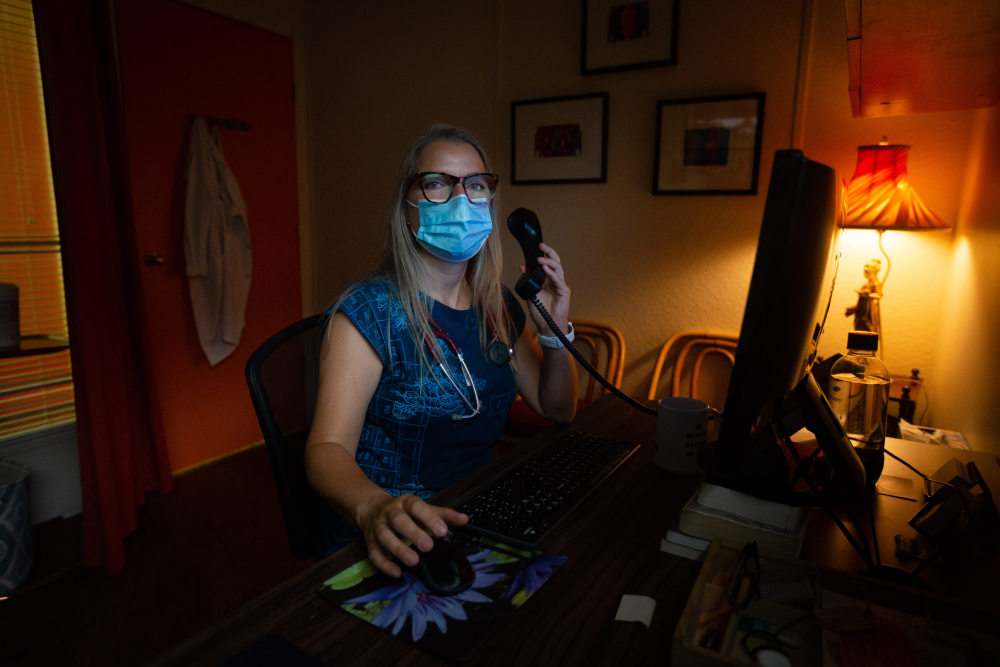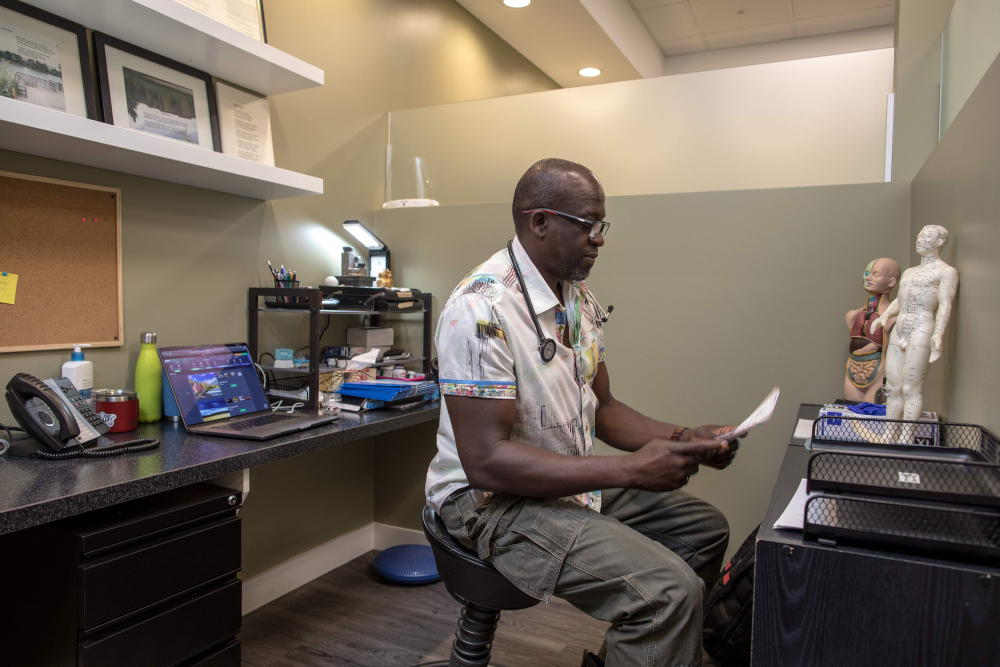Maryam Zeineddin is a family physician and the co-owner of a West Vancouver clinic that provides traditional primary care.
She and the seven other doctors working at the Ambleside Medical Centre no longer deliver babies, but otherwise they provide a wide variety of care over the course of each patient’s lifetime. They even make house calls.
It’s a model of care that has been disappearing, and Zeineddin said it’s difficult to sustain. The clinic’s overhead keeps going up, but the fees the government pays physicians to provide services do not.
“In a weird way we’re called business owners, but business owners set their own fees and we don’t set our own fees.”
Many physicians are getting worn out, Zeineddin said in a May interview, and there’s a sense that Telus and other corporate care providers are circling, looking for more clinics to buy and ways to gain access to more patients.
She worries about what the shift means for the future of care and wonders why there isn’t more public discussion of it — including from the Doctors of BC, the organization that represents the profession.
“The arena is very quiet, and the tsunami is about to hit us,” she said.
Greater involvement by corporations in primary care is likely to lead to an overall deterioration in the quality of the care, she said. Already many doctors work 40 hours a week, she said, but only get paid for 20 of them under the government’s fee-for-service model — a situation that will worsen if corporations siphon off the patients who are easiest and quickest to treat.
Zeineddin said she believes corporate providers will focus on seeing as many patients as possible who are well, since that’s the way to make the most money. They are unlikely to offer continuity of care to patients and instead will focus on numbers, efficiency and how to increase profits, she predicted.
Physicians are governed by ethical boundaries — such as not being able to profit by selling a product to a patient or by recommending a particular service or pharmacist — that businesses outside the profession aren’t subject to, she said. If corporations are going to provide care, they should have to meet the same ethical standard, Zeineddin said.
“Corporate values are very different from physician values, let’s be honest, and it can really be a detriment for patient care,” she said. “I think the public really needs to know what’s going on.”
Rita McCracken says increased privatization will lead to a patchwork system where different levels of service are available to people based on what they can afford, much as we already see in the education system.
McCracken is a family doctor who practises in East Vancouver, provides care in a nursing home and teaches at the University of British Columbia.
“The people who are really good at advocating for themselves and/or have significant financial resources available to them, they would be OK,” she said. “But those who are marginalized or experiencing, on a day-to-day basis, the effects of racism, colonization and poverty, they would get left behind.”
Allowing a shift to corporate care doesn’t even make financial sense for the government, McCracken added. “We have a good body of evidence that shows us that if we don’t get in front of health-care problems... ultimately it costs the health system more by longer hospitalizations, more frequent hospitalizations, and more significant interventions that are required.”
A lack of access to continuing care for vulnerable groups would bring those kinds of increased costs, she said.

But she could see why corporations might attract doctors from clinics like hers. “Running a business in British Columbia’s urban centres is extremely costly and volatile,” she said.
Rents are increasing, hiring and keeping staff is challenging and primary care has become increasingly complicated to deliver, she said. There are more than 1,200 guidelines that family doctors are supposed to be up to date on and following so they can give their patients the best possible care.
“There’s this tsunami of information of how we’re supposed to be preparing patients to have the very best health that they possibly can, and we’re asking those same doctors to organize a business and run a business in an extremely difficult business environment, and we don’t train them to run a business,” she said.
Most are now working in more than one location and only a portion of what they do is typical family doctor work, McCracken said.
“This fact explains why, despite the fact we have more family doctors than ever registered in British Columbia, that one-sixth of British Columbians still can’t find a family doctor,” she said. “It’s because those family doctors are gainfully employed doing other work that is not longitudinal, community-based primary care because that job model to do that work is so antiquated and unattractive.”
Year after year she sees the trainee doctors who come through her clinic move into jobs in hospitals or other team-based settings. They continue to do important work, she said, but the shift is “starving the community-based primary care of additional service providers.”
Many doctors graduate with large amounts of student debt and may balk at the idea of taking on more debt to open a family practice.
Other family doctors are reaching the end of their careers and retiring, or in some cases are burning out and leaving the profession sooner than they would if the working conditions were better.
Clinics like McCracken’s run on a fee-for-service model where the provincial government pays doctors for each service they provide. Out of those payments they cover their salary, staff costs, office rent, equipment and any other overhead.
“Imagine if a school couldn’t run unless a teacher agreed to bring their salary and give 25, 30, 35 per cent of the salary so that they could rent a building, hire a secretary,” she said. “We’ve been hamstrung into this adherence into the fee-for-service structure.”
There’s a lot of talk about changing the model, but little action, McCracken said. “I’m hearing a lot of really encouraging rhetoric about where we need to be going. Every conversation that we’re hearing about primary care includes the word ‘team’ and we are talking about creating alternatives, but we’re not actually seeing a lot of that.”
Part of the issue, she said, is an earlier generation of doctors who believe the fee-for-service model has worked well for them and are resistant to change. The group Doctors of BC, which negotiates fees with the government, represents a wide variety of people with a wide variety of interests and opinions.
“As a member of the Doctors of BC, I have clearly stated I am interested in working in a different way and being paid in a different way,” McCracken said. “And I don’t have confidence that that is going to happen in any reasonable time frame, and I am very worried when I see how quickly corporate models are being picked up and facilitated in our current structure versus a non-profit group wanting to come together to deliver primary care.”
According to the most recent figures available from Statistics Canada’s Community Health Survey, about 4.3 million Canadians had no regular family physician in 2013. In B.C., the number of people in the province without a family doctor nearly doubled between 2005 and 2013, the most recent year for which figures are available.
The number has stayed high despite efforts of successive governments, including the A GP for Me program under the BC Liberals and various announcements about reforming primary care from the current NDP government.

West Kelowna family doctor Toye Oyelese knows the figures on the number of people lacking access to a family doctor, but questions what they really mean. There are at least eight new physicians taking patients in Kelowna, including four working with him.
“We have people available and we don’t exactly have people breaking down the walls, so there’s a disconnect somewhere,” he said. “I think part of it is a significant number of them don’t have family physicians by choice. Then what happens is when they have a problem and they’re running around looking for somebody, then they’re frustrated because they can’t just pick somebody.”
People have an unrealistic expectation of instant service, and it’s up to doctors to educate the public on what good care is about, he said. “It’s a relationship. We develop that relationship over time. You don’t just go get a family physician when you’re sick, you get a family physician before you get sick.”
Oyelese has practised medicine in Canada since 1991 and said the corporations are moving into a void that the system had otherwise failed to fill. People will gravitate towards care that’s convenient, even if it’s a “fast food” style model that may not be the best for them, he said.
“My feeling is corporate medicine is here, and it’s here whether we like it or not,” he said. “If it succeeds it will be because the public likes what these people are selling, and medical practitioners also have embraced it.”
For Oyelese, therefore, it’s a matter of regulating rather than blocking corporate primary care. He notes that they could help ease pressure in some overburdened parts of the system. “I’ve always been supportive of a dual health system, private and public, but I’m very apprehensive of an unregulated or improperly regulated private system.”
Regulators need to be clear eyed about what corporations are offering and how they view the world, he said.
“The reason businessmen get involved with things is the hope of unlimited profit. That would be the main goal,” he said. “If there aren’t good regulations in place, the opportunity for exploitation is very high.”
He gave the hypothetical example of a physician wanting to prescribe a particular drug they think is best for a patient but getting overruled by a corporate policy. “My concern is working in corporations, you’ve got to toe the line. Everybody knows that.”
When corporations own more clinics and provide more primary care through telehealth, Oyelese said, they’ll have political clout and be in a position to blacklist doctors who insist on autonomy. “At some point after you’ve seen them break one or two people, everybody falls into line,” he said.
And yet nobody in Canada seems to recognize the shift that’s taking place or taking proactive steps to make sure people are protected, Oyelese said.
“We’re just approaching this like children. Canada is all innocent, ‘Oh, it’s going to be OK.’ No, it’s not,” he said. “This is years of concerted effort. These corporations have been poised to come in and takeover for a long time.”
West Vancouver doctor Zeineddin had suggestions for how to make things better.
One was that a law should require clinics to be led by physicians. Another was for better support through the health-care system for the kind of care that’s best for patients.
“If you look long term, where the money should go is into community care, not urgent care,” Zeineddin said in May. “We really need our governing bodies to value family practice and primary care.”
Everyone knows there’s a shortage of family physicians, but to understand the causes people need to look at why people graduating medical school are opting out of family practice, she said. “It’s only because they’re not being valued in this health-care system.”
The public doesn’t even understand what’s at risk, Zeineddin said.
“They need to know how good it is under the circumstances, and how bad it can be in the future when we’re no longer there.” ![]()
Read more: Health, Rights + Justice, BC Politics

















Tyee Commenting Guidelines
Comments that violate guidelines risk being deleted, and violations may result in a temporary or permanent user ban. Maintain the spirit of good conversation to stay in the discussion.
*Please note The Tyee is not a forum for spreading misinformation about COVID-19, denying its existence or minimizing its risk to public health.
Do:
Do not: